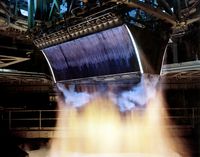POLARIS receives Bundeswehr Study Contract for Linear Aerospike Rocket Engine Design and Flight-Testing
25.04.2023
POLARIS is pleased to announce that BAAINBw (Federal Office of Bundeswehr Equipment, Information Technology and In-Service Support) has awarded POLARIS a contract to study the potential of a linear aerospike (LAS) rocket engine as propulsion element in a spaceplane demonstrator. As part of the contract, an LAS rocket engine will be ignited and tested in flight for the first time.
LAS form a novel class of rocket engines that enable major efficiency increases compared to conventional rocket engines. Depending on the mission scenario, this allows for higher payload mass, reduced vehicle take-off mass, and increased performance in terms of vehicle flight Mach number, flight altitude and flight range.
LAS rocket engines were supposed to be used as the main propulsion system for the planned Space Shuttle successor X-33/VentureStar and were ground-tested by NASA in the 1990s. NASA had also installed and flown a LAS cold-flow-demonstrator on the back of a SR-71 Blackbird. However, LAS rocket engines have so far never been operated in flight.
XRS-2200 Linear Aerospike Testing in the 1990s (NASA)
Linear Aerospike Cold-Flow Demonstrator installed on the Back of an SR-71 Blackbird (NASA, 1998)
A principal technological challenge in LAS rocket engines has been the engine cooling, which can be significantly more challenging compared to conventional rocket engines. However, recent advances in 3D-printing enable new cooling concepts that were previously not feasible.
While aerospike rocket engines can be of major benefit for various classes of space launch and hypersonic vehicles, the unique geometry of LAS makes them particularly interesting for the flat-shaped spaceplane projected at POLARIS. In addition to increases in propulsion performance, LAS allow for simpler engine integration into the spaceplane, reduced aerodynamic drag during turbine-powered cruise or reentry gliding flight, and can solve potential tail-strike issues during take-off and landing. Therefore, LAS rocket engines have been selected as the baseline propulsion system for the projected spaceplane.
For the aerospike in-flight validation within the study, POLARIS will build a dedicated scaled spaceplane demonstrator, larger and heavier than the three vehicles previously built and flown. This aerospike in-flight validation will form a major milestone on the roadmap towards an operational spaceplane.
With the new contract, POLARIS received the third consecutive spaceplane-related Bundeswehr study contract with increasing complexity.

%20NASA.jpg/picture-200?_=187a432757f)